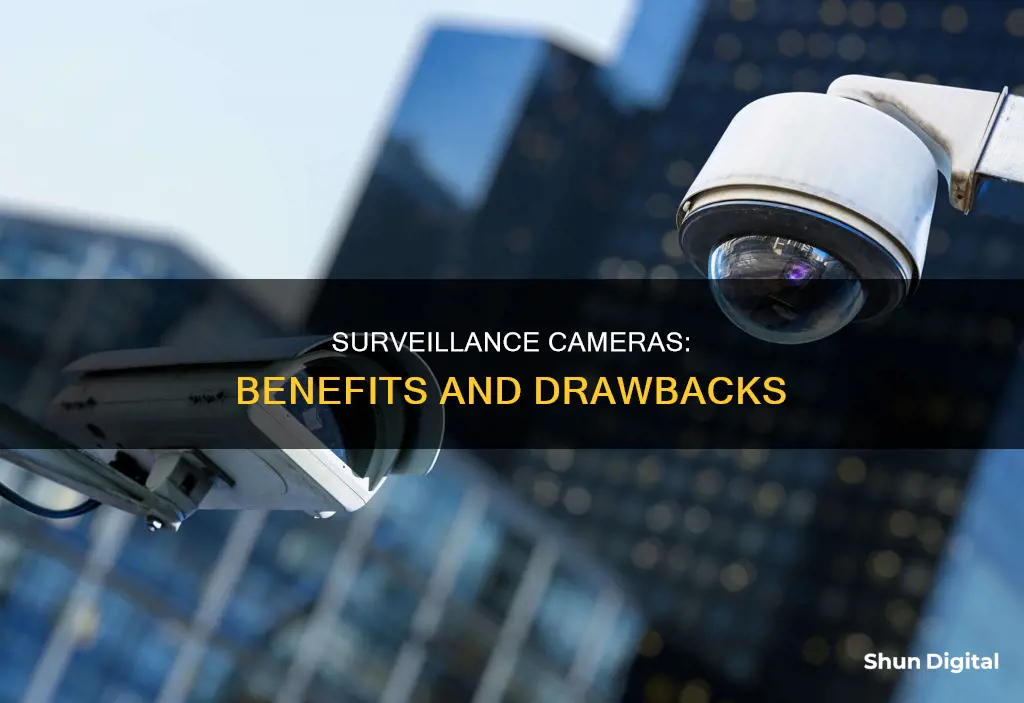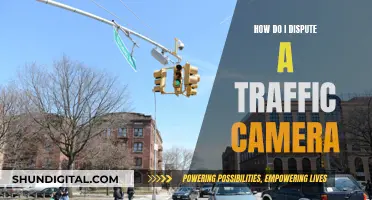
The use of surveillance cameras is a highly debated topic, with some people feeling more secure with them and others feeling nervous about being under constant surveillance. While surveillance cameras can increase public safety and help catch criminals, they also raise concerns about privacy invasion and can be costly to install and maintain. Additionally, they may give a false sense of security and be vulnerable to hacking if not properly installed.
| Characteristics | Values |
|---|---|
| Crime deterrence | Surveillance cameras deter crime and reduce crime rates |
| Monitoring | Cameras allow for remote monitoring of scenarios and activities |
| Evidence gathering | Footage can be used to gather evidence and aid legal proceedings |
| Decision-making | Recordings can help settle disputes and arrive at correct decisions |
| Record-keeping | Cameras maintain records of events, which can be useful for future reference |
| Privacy concerns | Surveillance can invade privacy and record individuals' private lives |
| Cost | Installation and maintenance of cameras can be expensive |
| Vulnerability | Cameras are vulnerable to damage and tampering |
| Theft | Surveillance may not prevent theft and only aid in gathering evidence |
What You'll Learn

Crime deterrence and prevention
Surveillance cameras are an increasingly common feature of modern life, but do they help to deter and prevent crime?
There is evidence to suggest that surveillance cameras do indeed deter crime. According to the FBI, property crime made up 85% of all crimes in the US in 2019, with around 7 million reported cases. Since then, the number has consistently dropped, with the implementation of security camera systems believed to have played a role in this reduction. A study by UNC found that outdoor security cameras reduce the chance of property crime by at least half. Further studies by Rutgers University and the Urban Institute have also recorded a decrease in crime rates in areas where surveillance cameras have been installed.
In addition to acting as a deterrent, surveillance cameras can also help to prevent crime by providing authorities with the opportunity to intervene before a crime occurs. For example, if suspicious individuals or items are seen in an area, the police can be contacted and innocent bystanders can be moved out of harm's way. This was seen after the Marjory Stoneman Douglas High School shooting in 2018, which led to the death of 17 students and staff. Administrators introduced AI-powered facial recognition security systems to campuses to help identify potential threats and enable authorities to act before any harm was done.
Surveillance cameras have also been shown to reduce crime rates. In Humboldt Park, for instance, crime rates dropped by 20% after video surveillance was implemented. This can be attributed to the deterrent effect of surveillance cameras, as potential criminals are less likely to commit a crime if they know there is a risk of being caught on camera.
However, it is important to note that surveillance cameras are not a perfect solution to crime deterrence and prevention. While they can be a useful tool, they are not always effective in stopping determined criminals or preventing horrific acts such as terrorism. Additionally, the cost of installing and maintaining surveillance cameras can be high, leading some to question their effectiveness in reducing crime.
In conclusion, while surveillance cameras have been shown to deter and prevent crime in some cases, they should be viewed as just one part of a comprehensive security system.
ZS50: In-Camera Charging Supported?
You may want to see also

Evidence collection and dispute resolution
Surveillance cameras can be a valuable tool for evidence collection and dispute resolution. They can provide clear and objective visual evidence, coupled with audio, of a series of events, which can be used to resolve disputes and support legal investigations.
For example, in the case of a minor car accident, footage from a surveillance camera can provide reasonable compensation for those involved. In another instance, a surveillance camera can capture a neighbour snooping and violating personal information. In both cases, the footage can be used to resolve disputes and, if necessary, pursue legal action.
In addition, surveillance cameras can be used to monitor scenarios and activities, providing peace of mind for homeowners and business owners alike. They can also help maintain records, which can be useful for reference in the future, such as monitoring incoming traffic or keeping a record of visitors to a property.
However, there are also disadvantages to consider when using surveillance cameras for evidence collection and dispute resolution. Privacy is a significant issue, as cameras can record everyone within their range, raising concerns about the invasion of privacy. There is also the risk of abuse, with footage potentially being used for voyeurism or blackmail. Furthermore, the effectiveness of surveillance cameras can be limited by their reliance on technology, which can fail or be hacked, leading to potential issues with image quality and data integrity.
To balance the benefits and drawbacks, it is essential to have clear policies in place regarding camera placement, data storage, and regular reviews of the system's effectiveness and ethical implications.
Exploring Camera Raw Files: A Quick Preview Guide
You may want to see also

Privacy concerns
Privacy is a significant concern when it comes to the use of surveillance cameras, and this issue has sparked intense debates. Many individuals feel that surveillance cameras in public spaces and even in their homes violate their privacy. This section will delve into these privacy concerns, exploring how surveillance cameras can impact private life, trust, and personal freedoms, as well as discussing the legal boundaries surrounding their use.
Invasion of Privacy
Surveillance cameras in public areas, such as streets, parks, stores, and schools, can monitor an individual's every move, creating a detailed picture of their private life. This constant monitoring makes people feel nervous and watched, raising serious privacy concerns. While some accept the presence of cameras in non-private areas like parking lots or businesses, many still consider it an invasion of privacy.
Legal Boundaries
The laws surrounding the use of surveillance cameras vary. In New York, for example, police can only use video surveillance in criminal investigations with a warrant from local authorities. Additionally, placing cameras in areas where individuals have a reasonable expectation of privacy, such as bathrooms and changing rooms, is prohibited. However, the lack of comprehensive laws regulating public surveillance has led to concerns about the potential for abuse.
Trust and Family Dynamics
The presence of surveillance cameras can damage trust between family members and employees. People may feel that the installation of cameras implies a lack of trust, creating tension and discomfort. This can be particularly true for home security cameras, where family members and visitors may feel their privacy is being invaded.
Potential for Abuse
Surveillance cameras provide valuable evidence for investigations and can increase public safety. However, there is a risk of abuse. Information collected by cameras can be used for blackmail, voyeurism, or stalking. Without proper regulations and checks and balances, the potential for abuse of power is high, and this has sparked concerns among privacy advocates.
Effectiveness and Cost
The effectiveness of public security cameras in preventing crimes, especially terrorist attacks, is questionable. Suicidal bombers or determined thieves, for instance, may not be deterred by the presence of cameras. Additionally, the high cost of these systems has led to debates about whether the benefits justify the expense, with some arguing that the money could be better spent elsewhere.
In conclusion, while surveillance cameras offer benefits, there are significant privacy concerns. The potential invasion of privacy, abuse of power, and questions about effectiveness and cost have sparked intense debates. To address these concerns, strict regulations, comprehensive laws, and improved checks and balances are necessary to ensure that surveillance cameras do not infringe on civil liberties and personal freedoms.
Surveillance Camera Viewing on Fire TV Stick
You may want to see also

Cost of installation and maintenance
The cost of installing a surveillance camera system varies depending on the number of cameras, the type of cameras, and the complexity of the installation. On average, the cost of installing a surveillance camera system in a home ranges from $594 to $2,040, with the average cost being around $1,298.
The cost of the cameras themselves can range from $20 to $250 per camera, depending on the type and features included. For example, outdoor cameras tend to be more expensive than indoor cameras due to their higher resolution, wider field of view, and increased installation difficulty.
In addition to the cost of the cameras, there is also the cost of labour, which can vary depending on the expertise required and the number of cameras being installed. The labour cost for installing a surveillance camera system can range from $50 to $200 per camera, with the average cost being around $80 to $200 per camera.
The type of surveillance camera system can also impact the cost of installation. Wired camera systems, such as CCTV cameras, tend to be more expensive to install than wireless camera systems. This is because wired camera systems require running cables through walls and drilling holes, which increases the labour cost. Wireless camera systems, on the other hand, are typically easier to install and may not require professional installation, resulting in lower installation costs.
Overall, the cost of installing a surveillance camera system can vary significantly depending on the specific needs and requirements of the user. It is important to consider the number of cameras, the type of cameras, and the complexity of the installation when determining the cost of a surveillance camera system.
To ensure proper installation and functionality, it is recommended to consult with a professional installer or security company, as they can provide expertise and guidance on the best camera system for your needs.
The Evolution of Photography: First Camera Invention
You may want to see also

Vulnerable to damage and hacking
Surveillance cameras are vulnerable to damage and hacking. As electronic devices, they can be disabled by impacts, water damage, or lightning strikes. They can also be tampered with or hacked by criminals. While outdoor cameras are designed to withstand standard weather conditions, they may not be able to withstand extreme events or vandalism.
In addition, any device connected to a network can be hacked by a committed criminal. This includes surveillance cameras, which, if hacked, can compromise the security and privacy of those being monitored. Improper installation or low-quality equipment can further increase the risk of hacking.
To minimize the risk of damage or hacking, it is important to choose a reputable company with decades of industry experience for installation and maintenance. Regular maintenance and monitoring by professionals can help ensure that cameras are functioning properly and are protected from unauthorized access.
Furthermore, individuals can take steps to secure their cameras by using strong passwords, enabling two-factor authentication, and regularly updating camera firmware and software. By taking these precautions, the risk of hacking can be significantly reduced.
While surveillance cameras offer numerous benefits, such as deterring crime and providing evidence, it is crucial to address their vulnerabilities to ensure the effectiveness of the security system and protect the privacy of individuals.
The Megapixel Mystery: Uncovering 90s Bank Surveillance Camera Secrets
You may want to see also
Frequently asked questions
Surveillance cameras can increase safety and reduce crime rates. They can also help catch criminals and provide evidence and clues in criminal investigations. Additionally, they offer convenience in the form of traffic cameras that monitor road conditions and prevent drivers from running red lights.
Surveillance cameras can be easily abused and raise concerns about privacy invasion. They are also expensive to install and maintain, and their effectiveness in deterring crimes, especially horrific acts like terrorism, is questionable.
Yes, while laws prohibiting surveillance cameras in public spaces are limited, it is important to respect individuals' privacy. Placing cameras in areas where people have a reasonable expectation of privacy, such as bathrooms or changing rooms, is generally prohibited. In some jurisdictions, such as New York, police may only use video surveillance footage for criminal investigations with a warrant from local authorities.







